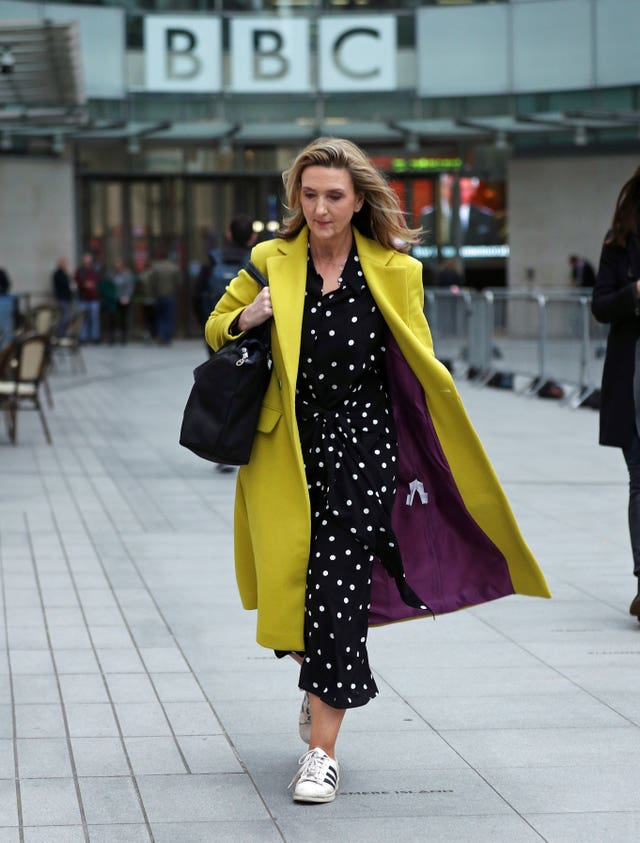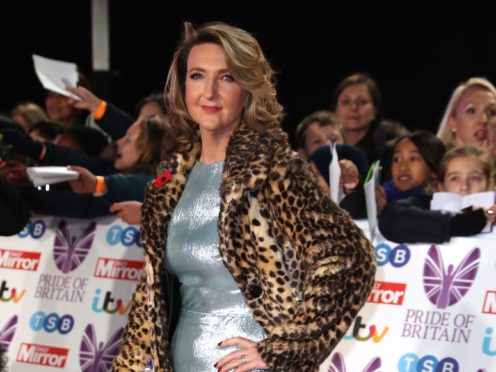Victoria Derbyshire has said she is “absolutely devastated” at the BBC’s plan to axe her show, having first read about it in a newspaper.
The broadcaster wants to pull the presenter’s daily BBC Two current affairs programme from the schedule, blaming cuts.
Derbyshire spoke out as BBC director of news and current affairs Fran Unsworth told staff it had “not been an easy decision”.
Absolutely devastated at the plan to end our programme (which I first learned about in yesterday’s Times). I’m unbelievably proud of what our team and our show have achieved in under 5 years.. 1/3
— Victoria Derbyshire (@vicderbyshire) January 23, 2020
The 51-year-old broadcaster tweeted hours after going on air to present her show.
She told her followers: “Absolutely devastated at the plan to end our programme (which I first learned about in yesterday’s Times).
“I’m unbelievably proud of what our team and our show have achieved in under five years breaking tonnes of original stories (which we were asked to do); attracting a working class, young, diverse audience that BBC radio & TV news progs just don’t reach (which we were asked to do); and smashing the digital figures (which we were asked to do).”
I’m gutted particularly for our brilliant, young, ambitious, talented team – love ‘em. And for all those people we gave a voice to. Love them too. 3/3
— Victoria Derbyshire (@vicderbyshire) January 23, 2020
She said she was “gutted particularly” for “all those people we gave a voice to”.
Unsworth confirmed plans for the show, which hit the headlines with its interviews on abuse in football, to end later this year, saying “this has not been an easy decision”.
She praised the programme, which was hailed in the BBC’s annual report, as “exactly the type of journalism we need to continue” and described Derbyshire as “a hugely talented and engaging presenter”.
But, she said, “audience behaviours are changing. Linear television viewing is declining, and as we progress with our £80 million savings target, it is no longer cost-effective to continue producing the programme on television”.

Derbyshire, who receives a pay packet of between £215,000 and £219,999 according to the last BBC annual report, “will continue to be a central part of the BBC News team” and “will be taking a wider role across our broadcast and digital output”, Unsworth added.
The decision is part of a wider series of changes to be announced next week.
Derbyshire declined to answer questions following her show on Thursday.
She kept quiet as she left the BBC headquarters in central London at around 2.45pm before hailing a taxi.
Earlier, Derbyshire told viewers “We don’t give up” as she opened her show on Thursday.
“We are still here, telling your stories and covering the issues that are important to you in your life,” she said.
Victoria Derbyshire at the start of her show this morning:
"We are still here, telling your stories and covering the issues that are important to you in your life.
"And you know what? We don't give up." @vicderbyshire pic.twitter.com/QJPI9dvjOD
— Scott Bryan (@scottygb) January 23, 2020
Victoria Derbyshire’s show began in 2015 and broadcasts live on BBC Two and the BBC News channel every weekday from 10am.
The programme won a Bafta in 2017 and has been nominated for several awards, including RTS Presenter of the Year.
2/ The show won awards at the RTS and from BAFTA. Victoria nominated for Best Presenter 4 years in a row – and won once. Digital impact was huge. Show was designed to reach audiences the BBC struggles to connect with, and it did – online
— Amol Rajan (@amolrajan) January 22, 2020
The show’s former editor, Louisa Compton, has described the cancellation as “madness”, saying: “An organisation that values original journalism and under-served audiences should not be doing this.”
Anna Collinson, who works on the show, said: “It’s gutting for our viewers. The BBC is constantly criticised for failing under-served audiences – the same audiences we were proud to serve and served well. I have already heard from interviewees who are devastated by this news.
An organisation that values original journalism and underserved audiences should not be doing this.It’s madness.#VictoriaLIVE consistently breaks huge stories, has won countless awards including a BAFTA and has broken new ground. Plus it has an outstanding team and presenter. https://t.co/N3vkLpYBzg
— Louisa Compton (@louisa_compton) January 22, 2020
“We are a scrappy, feisty and passionate bunch and always did our absolute best to hold those in power to account.
“Whatever happens now, I will forever be proud of working for this award-winning programme and will never forget everything it taught me.”
Shadow culture secretary Tracy Brabin has written a letter to BBC director-general Lord Tony Hall, asking him to reconsider pulling Derbyshire’s programme.
Following confirmation that The Victoria Derbyshire Show is to be taken off air, I've written to Tony Hall.
The show is public service broadcasting at its best and it reaches an audience other parts of BBC News simply doesn't.
BBC should rethink and reverse decision. pic.twitter.com/zHKVInUVzZ
— Tracy Brabin MP 🌹 (@TracyBrabin) January 23, 2020
In a letter shared by Ms Brabin on Twitter, she said that Derbyshire “is an incredible journalist and I am certain that she has a very bright broadcasting future in front of her regardless of what happens with the show in the coming months.”
“I know that a show like this will have a dedicated and talented team working behind the scenes, who are probably predominately freelancers.
“It’s of the upmost (sic) importance that these workers are treated with dignity in this process – and that they did not find out that their role may be in jeopardy via social media.
“However, The Victoria Derbyshire Show itself is brave and courageous journalism at its very best. It seeks out the stories that are so rarely covered elsewhere and broadcasts them in a format that is popular with and accessible to millions.”
